I knew I was in for something special within minutes of attending the World Nomad Games And that was before the headless goats, or the warm yak's milk......
I'll get back to the headless goats and the yak's milk, but first a bit about the World Nomad Games, because if you're like me, you haven't heard of them.
What Exactly Are the World Nomad Games?
The official mission of the World Nomad Games is to: revive and preserve revival the historical cultural heritage of the nomadic people's civilization of the world.
I'd say that's pretty spot on. After attending the cultural and sporting events, I realized how little I knew about nomadic culture. Four dates later, I left with my eyes open to a whole new world.
The games have four different themes: martial arts and wrestling, horse racing and events, cultural events and intellectual games.
Are the World Nomad Games Similar to the Olympics?
The sporting results appear to be similar to the Olympics on the surface. Athletes come from across the world to compete for their countries. In 2016, a whooping 1200 participants came from 40 different countries. Not bad, considering that this was only the second time the event was held!
But a quick look at the event schedule and you quickly realize that unlike the Olympics, you'll hardly recognize any of the events. Mas-wrestling? Kok-boru? Yurt judging? And that's exactly what makes the World Nomadic Games so special.
Which Countries Participate in the World Nomad Games?
Participants are mainly from Kyrgyzstan and other former Soviet Republics. But they also come from Mongolia, Turkey, China. Even less obvious countries like Germany and Benin in West Africa take part. Athletes welcome the chance to compete in their sport of which there are few opportunities on the global scale. I spoke to two German participants who were competing in the archery competition. They spoke most about the camaraderie between competitors.
Where and When are the World Nomad Games Held?
The games are held on the shores of Lake Issyk-Kuk in Kyrgyzstan. They're held every two years in September. The next one will take place in 2018.
Highlights of the World Nomad Games
I had so many highlights of the World Nomad Games. As a result, I've broken them down into the following categories: Opening Ceremonies, Cultural Highlights and Sporting Highlights. It will really give you a feel for why I think the World Nomad Games are truly one of the coolest events on the planet.
Opening Ceremony Highlights of the World Nomad Games
The Opening Ceremony was a spectacular show featuring dancing, singing, horsemanship like I've never seen before anywhere and the participants coming on stage. Wrapping it up was a dramatic fireworks display. It was similar to an Opening Ceremony at the Olympics but with its own cultural relevant twists.
If Genghis Khan were alive, he'd want to be here, proclaimed the announcer at the Opening Games. The crowd went wild. Khan was the Founder and Emperor of the Mongol Empire in the 13th century. He united many of the nomadic tribes that conquered most of Eurasia. He's a legend in Kyrgyzstan.
It was one of the first differences I realized about the games - nomadic cultures of course have their own heroes. That's why I was shocked when they introduced the guest of honour, Steven Seagal dressed in Kyrgyz khan armour. In the west it's thought that his best days are behind him. Here he's revered, judging from the crowd's thunderous applause. Sometimes reality is stranger than fiction.
Cultural Highlights of the World Nomad Games
Cultural Performances
There were multiple cultural performances. These involved the participants wearing traditional clothing, singing, dancing and stunts on horses. There was so much going on, it was hard to know where to look. And it was captivating.
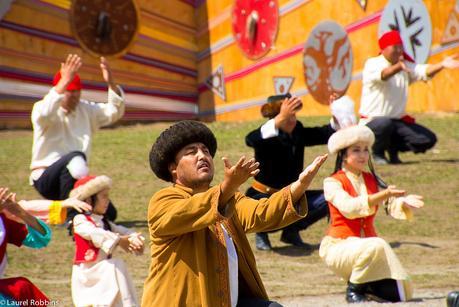
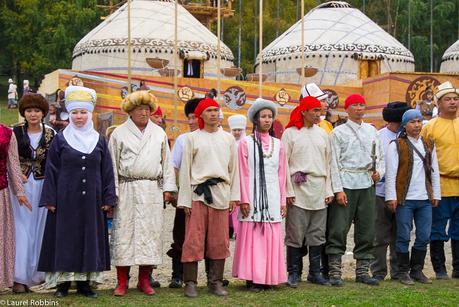
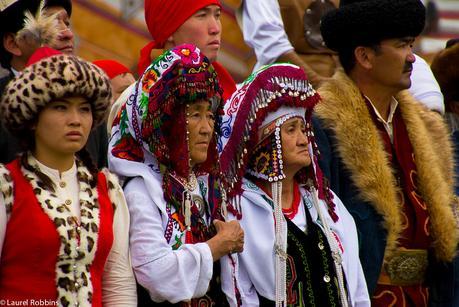
The Setting for the Cultural and Hunting Events
You couldn't ask for a more gorgeous setting than Kyrchyn Jailoo. It's a summer pasture, used by nomadic people for their animals. Here, there was an ethno-village set up of 9 settlements totalling over 200 yurts representing each of the Kyrgyzstan seven regions. In addition, Bishkek and Osh, the largest cities in the country also had settlements.
Kyrgyz people are incredibly welcoming, inviting you into their yurts for cookies and warm yak milk.
If I had to choose just my top highlight of the games, it would be meeting the inspiring Zura, an inspiring Kyrgyz woman spouting with wisdom.
She invited Nellie from Wild Junket and I into her tent and chatted with us for over 30 minutes. Zura is an important figure in her village in the eastern province of Naryn. She holds degrees in law, medicine and teaching. As a result, I felt wiser just being in her presence. One of my favourite quotes from her was:
Young women can wear whatever they want to look beautiful. Older women can't. They have wrinkles, extra fat, etc. They need to wear traditional clothing to help them look beautiful.
At 64, she is beautiful in both body and spirit.
I also met with one of the talented horsemen - or should I say horsewoman. In Kyrgyzstan it's not just the men who are athletic, the women are also kick-a**. I chatted with this rider who at just 17 has made a name for herself. She only really learned to ride a year ago when she joined the circus following in the footsteps of her sister. Her father is very proud of her. Horsemanship is something that Kyrgyz people take extreme pride in.
One of the most interesting yurts that I had the pleasure of visiting, was a musician's tent. I took part in an impromptu jam session...in a yurt on a Monday morning! Such a great way, and definitely one of the most unusual ways that I've ever started off my week. Travel tip: Yurt etiquette requires that men sit on the left, women sit on the right.
I also loved the marketplace where visitors can watch traditional handicrafts being made and of course buy.
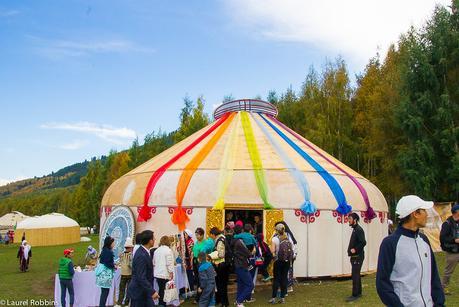
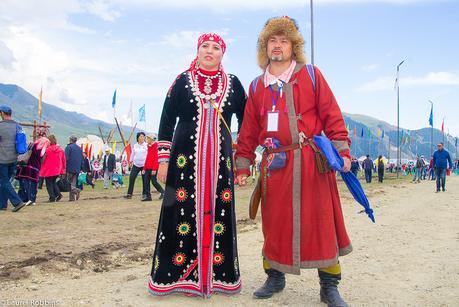
Another highlight was meeting a camel shepherd. Like many Kyrgyz people he is semi-nomadic. He lives in the city during the winter months working as a chef. In summer, he is nomadic following his camel herd. Find out more about Camels in Kyrgyzstan.
Also at Kyrchyn Jailoo were Salbuurun - Traditional Kyrgyz Hunting. Hunting birds such as falcons, hawks and eagles have long played an important rule in obtaining food. In the simulated events, the birds catch a pelt dragged along by a horse. The fastest one wins. I have very mixed feelings about this practice, which I'll explore further in another post. In a nutshell, the training is very harsh on the birds. On the other hand, the falconers develop a strong relationship and even a spiritual bond with their birds. I loved watching the falconers below connect with their birds.
Another Kyrgyz tradition is hunting with Taiga dogs. Taigan are a breed of dogs from Kyrgyzstan that are a source of national pride! They make excellent hunting dogs and can hunt at elevations up to 3000 metres. As such they've earned the nickname King of the Mountains. The competition at the World Nomad Games involves a simulated hunt.
Sporting Highlights of the World Nomad Games
While I'm not a fan of wrestling - I don't like to see people hurting each other, I was a fan of Mas-wrestling at the World Nomad Games. Here's how it works: opponents sit sole-to-sole on either side of a wooden barrier. The goal is to get your opponent on your side while still hanging onto the stick and keeping it parallel. Whoever gets the stick over to their side first wins. It's an incredible display of strength!
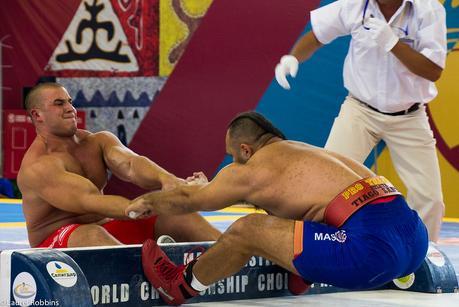
Finally, we have Kok-boru, the iconic game of Central Asia.
It's what hockey is to Canadians, what football (soccer) is to most of Europe and what baseball is to Americans.
It's like polo, only in place of a ball, a headless goat or sheep. The aim is to get the goat or sheep into your goal. Whoever has the most goals at the end of the game wins. It's not a game for the faint of heart. It's dangerous for the players to shift their weight, to try to pick up the goat or sheep weighing ~ 80 pounds. That's all while riding a horse and fending off your opponents.
In Kyrgyz nomadic culture, slaughtered animals mark auspicious occasions, such as weddings, birthdays or religious events. It's no different in Kok-boru. The revered prize is the animal which the winning team will eat. I can imagine that it would be very tasty. After all, it's well tenderized after being fought over.
The last match was epic, Kyrgyzstan versus Kazakhstan.
Fortunately Kyrgyzstan won this important game - national pride was at stake!
The diversity in activities and events at the World Nomad Games is absolutely incredible. It's enthralling watching new sports that you've never heard of, but certainly won't forget. I have a new-found respect for the athleticism this game requires. Both of the Kok-boru players and their horses. But my favourite part was learning about nomadic culture. Actually interacting with Kyrgyz people like Zura while sipping yak milk in their yurt is one of the coolest things I've ever done.
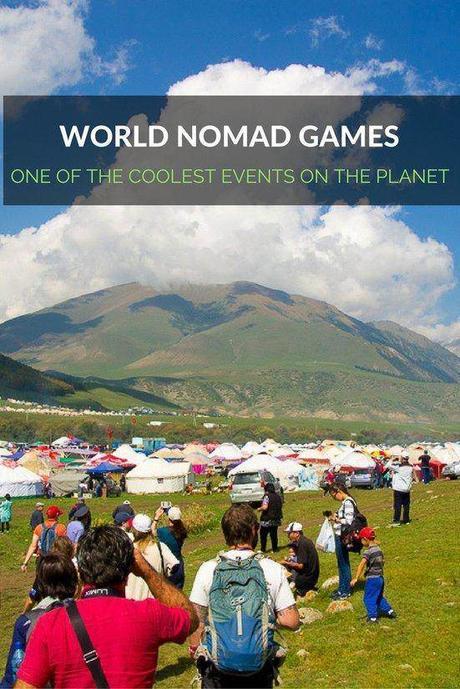 Note: My trip was organized in cooperation with Discover Kyrgyzstan, and made possible by the support of the United States Agency for International Development (USAID). All opinions are my own.
Note: My trip was organized in cooperation with Discover Kyrgyzstan, and made possible by the support of the United States Agency for International Development (USAID). All opinions are my own.

